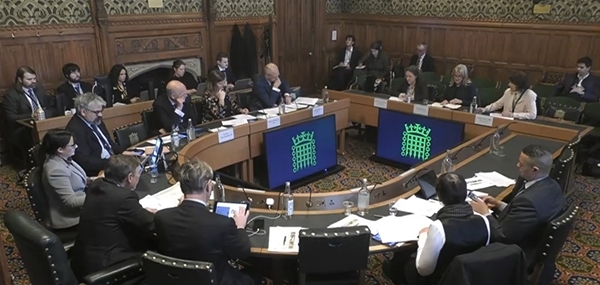On Wednesday 24 January, Teresa Dent CBE was on a panel of experts giving their witness statements about the role of natural capital in the green economy. Teresa joined Minette Batters, President of the NFU, and Judicaelle Hammond, Director of Policy and Advice at the CLA.
Describing the early successes of the Environmental Farmers Group, a farmer-led co-operative that collectively undertakes natural capital trades on a landscape scale, Teresa made a strong case for the benefits of this model in potentially delivering the government’s environmental targets.

This view was shared by Minette Batters, who made her support very clear. “I would like to see Environmental Farmer Groups that are farmer-led and farmer-owned right across the country,” she stated. “What I've witnessed from the very start of the Environmental Farmers Group on the Avon catchment is a real excitement and interest – not just from landowners, from tenants as well. What I see as a huge amount of farmer interest, whether it is in the uplands or lowlands. There was a real excitement around the [Farmer] Cluster movement, which don’t forget has been transformative. I think this takes it to the next level, so at the farmer level there is a huge amount of interest, excitement, and a real will to crack on.”
Asked about how trades and biodiversity benefits could be monitored, Teresa made it clear that professional monitoring capacity and cost are issues, but that there are potential solutions: “What GWCT would like to do is invent a methodology that takes use of modern technology such as acoustic monitors to design a catchment scale on-farm nature monitoring programme. That could give a big group of farmers working at a catchment scale a baseline for their nature, a target, and they can track it in between.”
The role of farmers as the potential drivers of positive change was clear. “Farmers look after 72% of England,” stated Teresa. “If we are going to meet the environmental improvement targets, we do have to get a lot of conservation effort on to that 72% because that's what’s going to deliver. It’s mathematically impossible for the 8% of land managed for nature to deliver all of what we need.”
She went on to add that agricultural land is an important habitat for biodiversity when it’s managed well, citing the work of the GWCT’s Allerton Project research and demonstration farm where in the mid-1990s we restored farmland bird numbers to what they’d been 30 years previously. As Teresa explained, this was achieved by managing most of the farm for food but ensuring 15% was managed for game and wildlife.
These biodiversity gains are something that farmers within the Environmental Farmers Group are also witnessing. “There are really nice opportunities to tell stories about what farmers are achieving through the EFG,” said Teresa. “On one of the groups of farmers in the Avon Valley catchment they’ve doubled their number of lapwing in six years and improved the breeding success, mainly through predation management, but also increased habitat so that the population is now stable.” She added that on one of the tributaries to the Avon, 30 farmers are coming together to do weekly water quality testing at 17 points along the river, so they know what quality the water is coming onto their farms and coming off. ”You have to give them a chance to get confident about what they’re doing and then they’re very happy to talk about it. I think more stories will emerge,” she added.
Asked about the support needed to get these initiatives off the ground, Teresa highlighted how most farms aren’t set up to make complex funding applications, many of which require 30-page forms to be filled in and are bound by an obtuse competitive framework rather than simple qualifying standards. Minette Batters agreed, highlighting the case of a farmer who was very enthusiastic about the different grants available, but had to employ somebody three days a week just to complete the necessary paperwork.
The benefits of Environmental Farmers Groups were outlined by all speakers, including how they allow farmers to spread the risk they might bear, that they’re learning from each other and that by working at scale, they will have a conservation plan which is designed to try to deliver the government’s environmental improvement plan. “That means that the trades become coordinated into that plan, so you’re not just sprinkling trades over the landscape in little dots. They’re forming part of the cohesive and connected plan that hopefully can deliver better outcomes, so there’s a win-win associated with it,” said Teresa.
Members of the committee were also keen to ask whether this new model would drive a wedge between tenant and landowner, something Minette refuted claiming that: “I personally, as a tenant, think the EFG is helping not hindering that relationship.”
She added: “I do think that co-operative way of working gives you the ability to be able to work as a big group and share knowledge. I can think of other examples across the country where farmers are really focused on the optimisation of agriculture, sharing what they’re doing working as farmer-owned, farmer-led groups. I think the more you can bring people together, to buy together, to sell together – whether that is within the world of the environment or whether that is within the commercial world of food production, bringing people together has got to be the best way forward. [...] It is so much better to bring a whole catchment together to be able to measure on a whole catchment basis. If you can imagine you could roll out that principle at scale then you really do have something that is very, very exciting.”